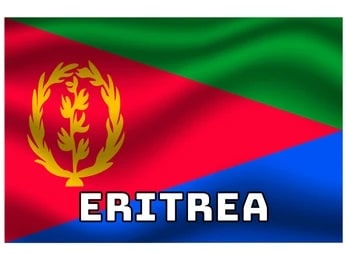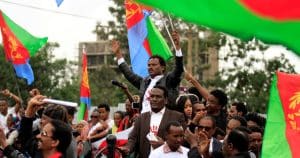Headlines
Eritrea Politics: A Country in Crisis and Isolation

Eritrea is a country in the Horn of Africa, bordering the Red Sea, Sudan, Ethiopia and Djibouti. Its name derives from the Greek word Erythraia, meaning “red”, which refers to the color of the sea. Eritrea has a rich and diverse history, influenced by various cultures, religions and empires.
See Population, Official Language And More…

Eritrea
The earliest evidence of human presence in Eritrea dates back to over one million years ago, when a hominid fossil was discovered at Buya. Eritrea was also part of the ancient Kingdom of Punt, which traded with Egypt and other civilizations around 2500 BC. Later, Eritrea was incorporated into the Aksumite Empire, which rose to prominence in the 1st century AD and adopted Christianity as its official religion. The Aksumites controlled most of the Horn of Africa and parts of Arabia, and were known for their monumental architecture, such as the obelisks at Aksum.
The decline of the Aksumite Empire in the 9th century AD led to the emergence of various local kingdoms and sultanates in Eritrea, such as the Kingdom of Medri Bahri and the Sultanate of Dahlak. These entities were often involved in conflicts and alliances with neighboring powers, such as Ethiopia, Egypt, Turkey and Portugal. Islam also spread in Eritrea during this period, especially along the coast and among the nomadic groups.
In the late 19th century, Eritrea became a target of European colonialism, as Italy established its presence in the region. In 1889, Italy formally annexed Eritrea as its first colony in Africa. The Italians developed the infrastructure and economy of Eritrea, especially around the capital city of Asmara, which became a showcase of modernist architecture. However, they also exploited and oppressed the Eritrean people, who faced racial discrimination and forced labor.
The Italian rule in Eritrea ended in 1941, when British forces defeated them during World War II. Eritrea then came under British administration until 1952, when it was federated with Ethiopia under a UN resolution. The federation was supposed to grant Eritrea autonomy and representation within Ethiopia, but it soon turned into annexation and domination by the Ethiopian government. This sparked a nationalist movement among the Eritrean people, who demanded independence and self-determination.
The Eritrean War of Independence began in 1961, when the Eritrean Liberation Front (ELF) launched a guerrilla campaign against the Ethiopian army. The war lasted for 30 years and claimed hundreds of thousands of lives on both sides. The ELF later split into several factions, including the Eritrean People’s Liberation Front (EPLF), which became the main rebel force. The EPLF managed to gain control over most of Eritrea by 1990, with the help of other Ethiopian opposition groups.
In 1991, after the fall of the communist regime in Ethiopia, Eritrea achieved its de facto independence. In 1993, following a UN-supervised referendum, Eritrea declared its formal independence and became a sovereign state. The first president of Eritrea was Isaias Afwerki, who had been the leader of the EPLF.
Eritrea faced many challenges in its post-independence era, such as rebuilding its war-torn economy and society, resolving its border disputes with neighboring countries, and establishing its political system and institutions. In 1998, a border war broke out between Eritrea and Ethiopia over the contested town of Badme. The war lasted for two years and resulted in tens of thousands of casualties and massive displacement. The war ended with a peace agreement in 2000, but the border issue remained unresolved until 2018.
Eritrea also faced criticism from the international community for its human rights violations and lack of democracy. The country has been under a one-party dictatorship since 1993, with no elections or constitution. The government has suppressed any dissent or opposition and has imposed severe restrictions on civil liberties and freedoms. The country has also been accused of supporting armed groups in Somalia and other countries in the region.
Despite these challenges, Eritrea has also made some progress in its development and stability. The country has improved its health care and education systems, reduced poverty and malnutrition rates, and preserved its cultural heritage and diversity. The country has also maintained good relations with some countries in Africa and Asia, such as Sudan, Qatar and China.
Eritrea is a young nation with a long history. It has endured many hardships and struggles for its freedom and dignity. It has also shown resilience and potential for its future. Eritrea is a country that deserves respect and recognition for its achievements and aspirations.
References:
One of the oldest hominids representing a possible link between Homo erectus and an archaic Homo sapiens: Eritrea was part of the ancient Kingdom of Punt: Eritrea was incorporated into the Aksumite Empire : [Italy formally annexed Eritrea as its first colony in Africa] : [Eritrea was federated with Ethiopia under a UN resolution] : [Eritrea declared its formal independence and became a sovereign state] : [A border war broke out between Eritrea and Ethiopia over the contested town of Badme]





